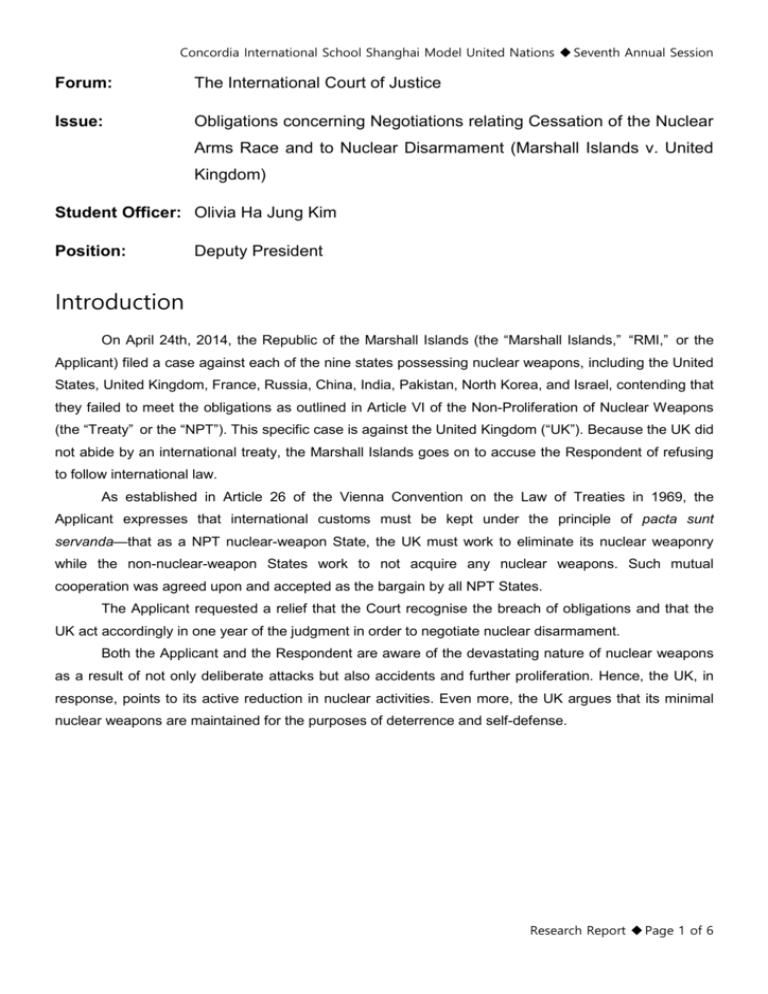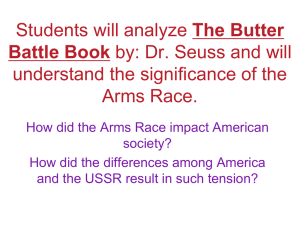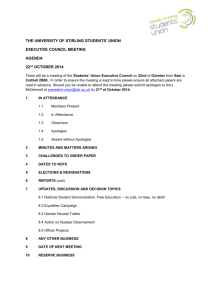Obligations concerning Negotiations relating to Cessation of the
advertisement

Concordia International School Shanghai Model United Nations ◆ Seventh Annual Session Forum: The International Court of Justice Issue: Obligations concerning Negotiations relating Cessation of the Nuclear Arms Race and to Nuclear Disarmament (Marshall Islands v. United Kingdom) Student Officer: Olivia Ha Jung Kim Position: Deputy President Introduction On April 24th, 2014, the Republic of the Marshall Islands (the “Marshall Islands,” “RMI,” or the Applicant) filed a case against each of the nine states possessing nuclear weapons, including the United States, United Kingdom, France, Russia, China, India, Pakistan, North Korea, and Israel, contending that they failed to meet the obligations as outlined in Article VI of the Non-Proliferation of Nuclear Weapons (the “Treaty” or the “NPT”). This specific case is against the United Kingdom (“UK”). Because the UK did not abide by an international treaty, the Marshall Islands goes on to accuse the Respondent of refusing to follow international law. As established in Article 26 of the Vienna Convention on the Law of Treaties in 1969, the Applicant expresses that international customs must be kept under the principle of pacta sunt servanda—that as a NPT nuclear-weapon State, the UK must work to eliminate its nuclear weaponry while the non-nuclear-weapon States work to not acquire any nuclear weapons. Such mutual cooperation was agreed upon and accepted as the bargain by all NPT States. The Applicant requested a relief that the Court recognise the breach of obligations and that the UK act accordingly in one year of the judgment in order to negotiate nuclear disarmament. Both the Applicant and the Respondent are aware of the devastating nature of nuclear weapons as a result of not only deliberate attacks but also accidents and further proliferation. Hence, the UK, in response, points to its active reduction in nuclear activities. Even more, the UK argues that its minimal nuclear weapons are maintained for the purposes of deterrence and self-defense. Research Report ◆ Page 1 of 6 Concordia International School Shanghai Model United Nations ◆ Seventh Annual Session Caption #1: The Stockholm International Peace Research Institute (SIPRI) announced the current world nuclear forces as of January 2013. Definition of Key Terms Disarmament The term refers to the act of reducing or entirely eliminating weapons—in this case nuclear weapons. Deterrence It is a punishing mechanism that prevents people, organizations, states, or other groups from behaving in a particular way. In this context, it is a way in which nations across the world are prevented from acquiring nuclear weapons. Non-proliferation It is the act of preventing the increase of nuclear weapons among countries. Nuclear Weapon It is a device that releases explosive energy from small matters. The explosion occurs as a result of nuclear fission, nuclear fusion, or a combination of the two processes. Bargain Bargain, in this context, is a principle that dictates that all terms should be met by participants and signatories of a treaty. A state would behave in a certain way only under the condition that the other state would behave in a certain way. Research Report ◆ Page 2 of 6 Concordia International School Shanghai Model United Nations ◆ Seventh Annual Session History Early Developments of Nuclear Weapons The United States was the first nation to develop and test nuclear weapons during the Second World War, when it attacked the two Japanese cities of Hiroshima and Nagasaki on August 6th, 1945 and August 9th, 1945 respectively. Between 1946 and 1958, the United States conducted 67 nuclear weapons tests in the Marshall Islands. The Soviet Union soon pursued the weapon as well on August 29th, 1945, followed by the United Kingdom in 1952, France in 1960, and China in 1964. The aforementioned nations are considered the only “nuclear-weapon States” under article IX.3 of the NPT, as they have manufactured and exploded their nuclear weapons before January 1st, 1967. There are other nations that also possess nuclear weapons including India, Pakistan, Israel, and North Korea, although they are not officially recognised as nuclear-weapon States by the NPT. Key Issues The Marshall Islands specifically asserts that the UK has failed to “pursue in good faith and bring to a conclusion negotiations leading to nuclear disarmament in all its aspects under strict and effective international control” as enshrined in Article VI of the NPT. Here, it is important to note that the statement includes both “good faith” and “conclusion,” indicating that it is not sufficient to merely demonstrate attempts to reduce weapons. The Applicant calls for the tangible eradication of nuclear weapons. The UK, on the other hand, firmly believes that it has continuously put in efforts and produced outcomes in terms of non-proliferation. For instance, the nation has decreased the number of warheads aboard on each of its submarine to a maximum of 40 and reduced the operational missiles in the Vanguard class submarines to no more than eight. The UK-Norway Initiative on nuclear warhead dismantlement verification further manifests the collaborative works that investigate nuclear arms control. With the possession of its decreasing nuclear weapons, the Respondent intends to deter attacks from other states. The UK could also points out the truth that non-nuclear-weapon States are not working towards fulfilling the bargain, as they are currently expanding their nuclear arms. Major Parties Involved and Their Views The Marshall Islands Although the UK has never tested its nuclear arms in the Marshall Islands, the Applicant has filed the case in order to adamantly challenge all nations that are currently developing nuclear weapons, as the very act is against the spirit of international law. It openly claims that the legal system must not Research Report ◆ Page 3 of 6 Concordia International School Shanghai Model United Nations ◆ Seventh Annual Session tolerate “any possibility of harm to humanity.” By not strictly complying with the terms written in the NPT, the UK has neglected its duty. As a non-nuclear-weapon State Party to the NPT, the Applicant acceded to the NPT on January 30th, 1995. It regrets the fact that the UK has always worked to enhance its nuclear arms, not to mention its collaborative treaties with other nuclear-weapon States to mutually improve research in nuclear arms. The UK has also been operating nuclear weapon patrols by the Royal Navy. The United Kingdom Replacing Polaris during the final decade of the Cold War, the UK currently has a single nuclear weapon system under Trident. As announced by its Secretary of State for Defence in 1993, its main purpose behind nuclear weapons is to deter potential aggressors. The principle of deterrence was further enforced after the terrorist attacks on September 2011 in the United States. Committed to the policy of the North Atlantic Treaty Organization (NATO), its Trident forces are solely meant for the defence of the Alliance. Government officials of the UK currently report that they have decreased their operational warheads from 520 to 120, alongside other significant forms of reduction in its nuclear weaponry. Timeline of Relevant Resolutions, Treaties and Events Date January 24, 1946 Description of event A/RES/1(1) - UN General Assembly Resolution was created to eliminate nuclear weapons and other weapons of mass destruction (WMD) from national arsenals. Agreement for Co-operation on the Uses of Atomic Energy for Mutual Defence August 4th, 1958 Purposes (“MDA” or “Mutual Defence Agreement”) was established between the United States and the United Kingdom. 1969 March 5th, 1970 The Vienna Convention on the Law of Treaties outlined the fundamental principle of Law of Treaties. The NPT was open for signature on July 1st, 1968 and entered into force on March 5th, 1970. “The United Kingdom Trident Programme” March, 1982 Defence Open Government Document 82/1 by the Ministry of Defence claimed that the size of nuclear forces maintained in the UK was extremely minute compared to those of the US and Soviet Union. Research Report ◆ Page 4 of 6 Concordia International School Shanghai Model United Nations ◆ Seventh Annual Session July 8th, 1996 The ICJ Advisory Opinion unanimously agreed that “there exists an obligation” for nations to partake in nuclear disarmament. The Comprehensive Nuclear-Test-Ban Treaty (CTBT) was adopted by the September 10th, 1996 United Nations General Assembly but was not entered into force because a few states refused to comply. 1997 July 8th, 1998 Model Nuclear Weapons Convention submitted by Costa Rica showed general obligations regarding nuclear weapons. The Strategic Defence Review was began to show signs of UK’s disarmament. “The Future of the UK’s Nuclear Deterrent: the White Paper, Ninth Report of 2006-2007 Session 2006-2007” by the House of Commons Defence Committee showed that the UK was using 5 to 6% of the national defence budget for nuclear forces. 2007 The UK-Norway Initiative between the UK and Norway began to host exercises and workshops to investigate safe disarmament. The Treaty for Defence and Security Cooperation between the UK and France was formed. Article 1 states that “The Parties, building on the existing strong November 2nd, 2010 links between their respective defence and security communities and armed forces, undertake to build a long-term mutually beneficial partnership in defence and security with the arms of: ensuring the viability and safety of their national deterrents, onsets with the Treaty on the Non-Proliferation of Nuclear Weapons.” A report of the Special Rapporteur on the implications for human rights of the September 3rd, 2012 environmentally sound management and disposal of hazardous substances and wastes (A/HRC/21/48/Add.1) was published. Research Report ◆ Page 5 of 6 Concordia International School Shanghai Model United Nations ◆ Seventh Annual Session Bibliography "Nuclear Disarmament United Kingdom | NTI." NTI: Nuclear Threat Initiative. N.p., n.d. Web. 14 Nov. 2015. <http://www.nti.org/analysis/articles/united-kingdom-nuclear-disarmament/>. (2014): n. pag. International Court of Justice. Web. 14 Nov. 2015. <http://www.icj-cij.org/docket/files/ 160/18296.pdf>. "Republic of the Marshall Islands ICJ Case." Republic of the Marshall Islands ICJ Case. N.p., n.d. Web. 14 Nov. 2015. <http://www.lcnp.org/RMI/>. "The Marshall Islands Versus the World's Nuclear Weapons States." The Nation. N.p., 26 Jan. 2015. Web. 14 Nov. 2015. <http://www.thenation.com/article/marshall-islands-versus-worlds-nuclearweapons-states/>. "Nuclear Weapon." Encyclopedia Britannica. N.p., n.d. Web. 14 Nov. 2015. <http://global.britannica.com/ technology/nuclear-weapon>. Research Report ◆ Page 6 of 6






